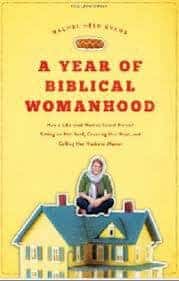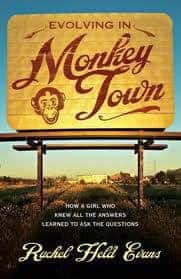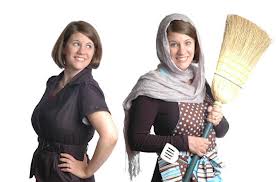 In case you haven’t noticed, Rachel Held Evans has a tendency to strike a nerve now and then when she writes.
In case you haven’t noticed, Rachel Held Evans has a tendency to strike a nerve now and then when she writes.
Her blog has become a go-to refuge for disaffected Christians who are journeying outside of familiar theological boundaries and are looking for voices to help them articulate their experiences—or at least to assure them they are not alone. In her first book, Evolving in Monkey Town: How a Girl Who Knew All the Answers Learned to Ask the Questions, Evans chronicled her own journey out of fundamentalism that mirrored the questions and experiences of many others.
For Evans, the fundamentalist Christianity of her upbringing (that seriously overlaps mainstream evangelicalism) doesn’t explain very well the world she actually lives in. It doesn’t even explain the Bible all that well. Evans writes as an explorer transparently looking for fresh articulations of her faith, i.e., for ways to bring her faith and her experiences into some sort of meaningful conversation. A lot of people are watching her go through this process, and it is fair to say she has quite a following—and along with that, as is always the case, a lot of critics.
Now, in her second book, A Year of Biblical Womanhood: How a Liberated Woman Found Herself Sitting on Her Roof, Covering Her Head, and Calling Her Husband “Master,” Evans takes aim at one specific issue that will be sure to divide even more clearly between fan and critic: what would it look like to take seriously the idea of being a “biblical woman,” i.e., what would it look like if women did what the Bible actually says?
The book has already made its mark, if internet discussions are any barometer. Some people love it for voicing what they are thinking, an ensign for a new way of looking at a nagging and pressing issue. And, predictably, some hate it for encouraging rebellion against God by voicing everything that is wrong with this new loosey-goosey generation of Christians who feel they can judge the Bible anytime they want to.
Reading a bit between the lines (and also from having read enough of her blogs, interviews, etc.), Evans has a problem with people using too freely “Bible” as an adjective (“biblical” for you grammatically challenged). Growing up as she did in the shadow of the infamous Scopes Monkey trials in Dayton, Tennessee, Evans is a particularly sensitive to how the fundagelical subculture uses “biblical” to great harm.
One area is the social pressure for young women to grow up to be a “biblical woman,” which in that subculture means things like needing to be married and bear children, quasi-subservience to the the authority of the husband and males in general, and basically the minimizing of the woman’s voice in the life of the church (organizing pot-lucks, running VBS, looking pretty, teaching children’s’ Sunday School, etc.).
Evans rightly puts the blame for this attitude on literalistic readings of the Bible that allegedly “command” such things of women. Briefly put, Evans exposes this type of literalism as unworkable and unavoidably selective, since no one really follows what the Bible says about women. Being “biblical” automatically involves us in hermeneutical process, so the question quickly becomes “Why are some things the Bible says seen as abidingly valid but other things aren’t?” Evan’s book models this type of basic hermeneutical engagement of the Bible
Evans also makes the point that some favorite go-to slam dunk passages in the Bible that command how women should behave are not really being understood according to their ancient context. The big culprit here Evans goes after is the list of a “wife’s” qualities in Proverbs 31:10-31.
Too often in fundagelical subculture this passage is used as a list of qualifications for a godly wife that young women  need to aspire to and that young men need to be on the prowl for. Taking her cue from contemporary biblical scholarship, Evans rightly points out that this list of behaviors (like weaving and economic savvy) are valued in the context of a ancient household-based patriarchal economy; Proverbs 31:10-31 is not an eternal to-do list for women to be truly godly. Evans also points out that Hebrew term that opens this section, eshet chayil, means something more like “woman of valor” rather than “good wife” (NCV) or “excellent wife” (NASV).
need to aspire to and that young men need to be on the prowl for. Taking her cue from contemporary biblical scholarship, Evans rightly points out that this list of behaviors (like weaving and economic savvy) are valued in the context of a ancient household-based patriarchal economy; Proverbs 31:10-31 is not an eternal to-do list for women to be truly godly. Evans also points out that Hebrew term that opens this section, eshet chayil, means something more like “woman of valor” rather than “good wife” (NCV) or “excellent wife” (NASV).
If I can thrown in my own two cents here, the “woman of valor” is an answer to the “adulteress [or wayward] woman” of Proverbs 1-9. In those chapters, Wisdom and Folly are both personified as women. The concrete expression of “Lady Folly” is the adulterous woman: “if you want an example of what a foolish life looks like, look at the adulteress.” We do not meet the concrete expression of Lady Wisdom until 31:10-31. The activities for which she is praised are the day-to-day mundane activities that occupy the entire book of Proverbs. The woman of valor in Proverbs 31 shows us all, men and women, what a life of Wisdom looks like: doing well in the small things. This “woman of valor” is a great ending to a practical book for all.
The problem Evans addresses is how the Bible has been used poorly, falsely, harmfully, in certain Christian subcultures in marginalizing women. She makes her point by lampooning a literalist hermeneutic, a rhetorical move that many of her conservative critics have inexplicably missed. Evans is not mocking the Bible, but exposing the illegitimacy and randomness of a literalist reading of the Bible; the book is an exercise in biblical hermeneutics.
To make her point, Evans took it upon herself to live like a “biblical woman” for one year, which meant observing (as much as possible) the various and sundry commands of the Bible concerning women. From October 2010 through September 2011, Evans focused each month on obeying the Bible around a cluster of biblical attributes and behaviors. For example, in chapter one her focus was “gentleness,” taking her cue from 1 Peter 3:3-4 (which speaks of women being adorned with gentleness rather than jewelry and fine clothes). The topics for the next eleven months were: domesticity, obedience, valor, beauty, modesty, purity, fertility, submission, charity, silence, and grace.
Along the way, Evans is not at all shy of pointing out some of the problems of what the Bible says about women. She isn’t too keen on the command to treat virgin daughters as property or for women to be silent in church (among other things). And she is clearly unsettled by how women are considered a plunder of war and other violent acts toward women that the Bible either condones or commands.
But these are issues that all Bible readers have to deal with, which is precisely her point: how to be a “biblical” woman is an exercise in mature, Christian biblical interpretation, not prooftexting.
What took me more by surprise was how she recounted with respect her experiences of living according to biblical models of womanhood. It will be clear to any alert reader that Evans is not mocking the Bible as some by-gone, worthless, relic of ancient misogyny (again, a point her entrenched critics have missed). Rather, with each chapter she is very clear about what she gained spiritually from her yearlong odyssey, helped along as she was by familiarizing herself with current Jewish practices of, say, keeping kosher (which is not exactly the same thing as in biblical times) and by hanging out with Amish, who actively try to model biblical simplicity in life.
 Rather than a rant against the Bible, readers will quickly see that Evans has found some deep source of wisdom in this process, and the big lesson learned is applicable to everyone: Taking the Bible seriously does not mean “do what it says.” No one lives that way, even hardened literalists. Taking the Bible seriously means reading it with discernment and living it out responsibly, and no biblical injunction concerning women is immune. Tracing what the Bible says or implies about women brings to the surface this unavoidable hermeneutical process.
Rather than a rant against the Bible, readers will quickly see that Evans has found some deep source of wisdom in this process, and the big lesson learned is applicable to everyone: Taking the Bible seriously does not mean “do what it says.” No one lives that way, even hardened literalists. Taking the Bible seriously means reading it with discernment and living it out responsibly, and no biblical injunction concerning women is immune. Tracing what the Bible says or implies about women brings to the surface this unavoidable hermeneutical process.
Readers who are conscious of the challenges that confront the application of an ancient text to contemporary life will benefit from the point Evans is making, even if they disagree with where she takes some things or some specific claims. (For example, Evans seems to have misunderstood Proverbs 21:9 as directing the contentious woman to live on the roof, when it is the husband who banishes himself there to get away from her.)
Those who will be most upset with her—and already are—are those who read the Bible as a Christian cookbook for life, an owner’s manual designed to plot out for us a list of dos and don’ts. These critics mistake Evan’s lampooning of literalism with a lampooning of Scripture, Christianity, Jesus, and God.
To paraphrase Jesus, “The literalists you will always have with you.” These critics, with their predictable and worn arguments, should not detract from the value this book will have for every-day readers, both to voice what they are thinking and to generate needed conversations.
What also likely irks her critics is that Evans writes in such an entertaining and engaging style. She is able to be snarky, funny, and insightful in the span of a single paragraph. Her style appeals directly to the masses, bypassing gatekeepers and fretful apologists. Evans has a wide sphere of influence and this will put some on red alert, feeling the need to protect the flock from this insidious, “unbiblical” influence.
But Evans has her finger on a strong cultural pulse, and books like this will continue to bring hermeneutical self-consciousness where it is needed most: to normal readers of the Bible. They already sense the urgency. What they need now are guides to put to words what they are thinking. Rachel Held Evans is quickly becoming one of them.
